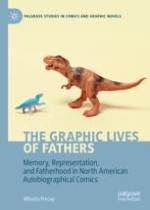2020 | OriginalPaper | Chapter
9. “You tell your father he did a good job”: Sons, Fathers, and Intergenerational Dynamics in Jeffrey Brown’s A Matter of Life
Author : Mihaela Precup
Published in: The Graphic Lives of Fathers
Publisher: Springer International Publishing
Activate our intelligent search to find suitable subject content or patents.
Select sections of text to find matching patents with Artificial Intelligence. powered by
Select sections of text to find additional relevant content using AI-assisted search. powered by
